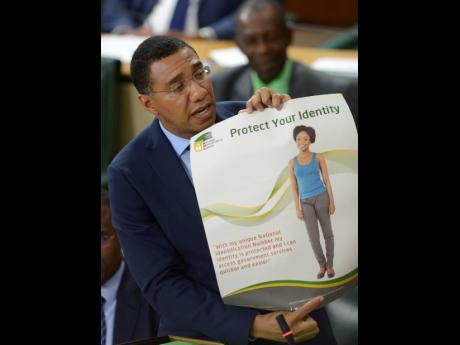Orette Fisher | Jamaicans need a national identification system
While most Jamaicans may have become aware of the push to establish a National Identification System (NIDS) in recent years, the idea is not new, and has, in fact, been on the drawing board from as far back as 1979.
The passage has been a roller coaster one, with different administrations giving it different levels of priority, with responsibility shifted from one ministry to another over the years.
A number of committees have been established, study tours have been undertaken, and a number of overseas consultants engaged, with limited results over the years.
I believe that the unfortunate thing in all this is that the expertise to develop and implement the NIDS resides right here in Jamaica.
THE DE FACTO NATIONAL ID CARD
For the average Jamaican, the voter’s identification card produced and issued by the Electoral Office of Jamaica (EOJ) has been the de facto national identification card for years.
There are primarily three main types of identification accepted by most institutions in Jamaica. None of these can be described as ‘national’ as they cater to a specific cohort in the society to the exclusion of others.
1. The passport is widely accepted but is limited to those who are passport holders. The cost of acquiring a passport is also prohibitive, especially to those with no intention of travelling. There is also a cost associated with renewal. Additionally, it is not very convenient to carry around and carries a high replacement cost if lost.
2. The driver’s licence is also widely accepted but is limited to those who are holders of a driver’s licence. There is also the cost associated with learning to drive and the periodic renewals.
3. The voter identification card is limited to those registered to vote and whose name appears on the voters’ list. This automatically rules out every Jamaican below the age of 18 years. Of major significance, however, is the fact that the voter’s card is the only one which is free, and, therefore, the most accessible to Jamaicans, including school leavers entering the world of work for the first time. The catch, however, is that they must be 18 years or older and be prepared to go on the voters’ list.
There are those who consider the Taxpayer Registration Number (TRN) a form of identification ,but it falls short as it does not carry any biometric data, and there is no photograph that allows the viewer to match it back to the person standing in front of him or her.
The voter’s card, therefore, is accessible to the largest cohort of Jamaicans and has become the most widely used and accepted form of identification. The result is that it also drives elector registration, resulting in a steady stream of Jamaicans being registered, not necessarily to vote, but in order to get an identification card. This is supported by an estimated 90 per cent of people, who, when they turn up at the EOJ registration centres under the system of continuous registration, indicate that they are there “to get their national ID”.
Based on the fact that a significant number of electors registered simply to get an ID card, there should be little surprise that a significant number, with little or no interest in politics, do not turn out to vote in elections.
From a purely political standpoint, one of the possible downsides of having the NIDS is that persons with no interest in voting will no longer see the need to register as an elector.
To its credit, the EOJ, being patently aware of the void, has, over the years, sought to improve the quality and security of the voter’s card, which, by the way, is not mandatory in order to vote as there are other means available to identify electors inside the polling station.
ESTABLISHING THE NIDS
The NIDS is necessary if Jamaica is to modernise and become a digitised society, able to accurately account for its citizens. It is important, therefore, that the leaders (Government and Opposition) are able to draft and pass legislation that satisfies the ruling of the courts and that makes the NIDS a reality within the shortest possible time.
It is also important that the local expertise that exists within the EOJ be tapped, and in so doing, reduces the cost to Jamaicans. The EOJ currently manages the approximately two million elector database, using fingerprints and photographs as a means of uniquely identifying electors. The EOJ is also conversant with the requirements of registering individuals in the unique Jamaican environment, something with which overseas consultants from developed countries are unfamiliar.
In fact, most, if not all consultants hired to implement the NIDS over the years have interacted extensively with the management of the EOJ, visiting its field offices in an effort to better understand the peculiarities of the Jamaican environment.
The EOJ must, in the meantime, continue to shoulder the responsibility of providing the vast majority of adult Jamaicans with an identification card that is acceptable to both the public and private sectors as well as the means of verifying the authenticity of cards that come into question.
The hope is that the NIDS becomes a reality sooner than later.
- Orette Fisher is an election management consultant and former director of elections Jamaica. Email feedback to columns@gleanerjm.com



